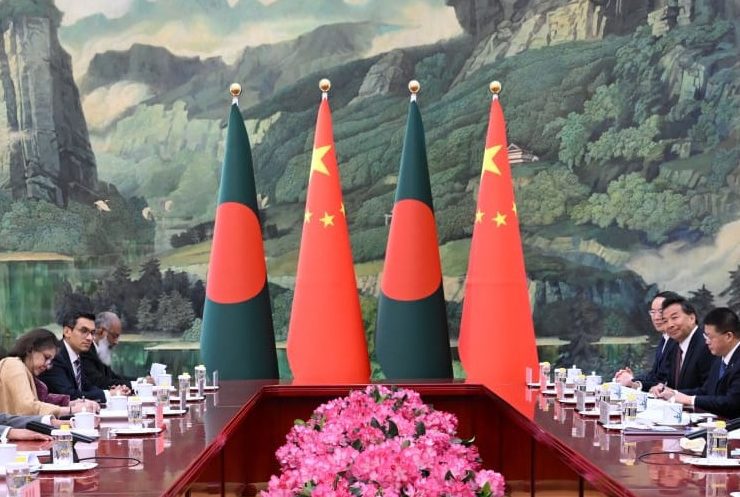Dhaka and Beijing have agreed to enhance cooperation in integrated water resource management, development, and technology exchange, as stated in a joint communiqué signed following a high-level meeting between Bangladesh and China.
The communiqué was issued on Friday after the head of Bangladesh’s interim administration, Muhammad Yunus, met with Chinese President Xi Jinping in Beijing.
Yunus commenced his four-day official visit to China on Tuesday, participating in the Boao Forum for Asia Annual Conference 2025 in Hainan before traveling to Beijing for bilateral discussions with President Xi.
During Yunus’ maiden visit to Beijing as the head of Bangladesh’s government, officials confirmed that nine agreements were signed, including an economic and technical cooperation pact between the two nations.
The communiqué highlighted agreements on hydrological forecasting, flood protection, disaster risk reduction, and river dredging. Bangladesh welcomed Chinese companies to participate in the Teesta River Comprehensive Management and Restoration Project (TRCMRP).
The statement emphasized that both nations would adhere to the principles of peaceful coexistence, strengthen political trust, and advance the China-Bangladesh Comprehensive Strategic Cooperative Partnership for mutual benefit.
They reaffirmed support on matters of core interest and major concern.
Bangladesh reiterated its commitment to the One-China principle, and acknowledged Taiwan as an inalienable part of its territory. Bangladesh also expressed opposition to ‘Taiwan independence.’
Dhaka and Beijing committed to advancing “Belt and Road” cooperation, strengthening industrial and supply chain collaboration, and working together toward modernization.
Bangladesh acknowledged China’s longstanding support for its economic and social development and praised the impact of China-Bangladesh cooperation on infrastructure projects, including bridges, roads, railways, power grids, and sewage treatment.
China pledged continued support for Bangladesh’s infrastructure and industrialization, encouraging Chinese investments in sectors such as textiles, clean energy, digital economy, agriculture, and manufacturing based on market principles.
Bangladesh welcomed Chinese participation in the Mongla Port Facilities Modernization and Expansion Project and expressed willingness to collaborate further on developing the Chinese Economic and Industrial Zone (CEIZ) in Chattogram.
Both sides stressed the importance of initiating negotiations on a China-Bangladesh Free Trade Agreement and optimizing the China-Bangladesh Investment Agreement.
They also agreed to expedite the export of high-quality Bangladeshi products, including fresh mangoes and other agricultural and aquatic goods, to China.
In 2025, both nations will jointly celebrate the 50th anniversary of diplomatic relations and the Year of China-Bangladesh People-to-People Exchanges. They also commended the signing of the Implementation Plan of the MoU on the Exchange of Hydrological Information of the Yarlung Zanbo-Jamuna River.
The two countries vowed to collaborate on climate change initiatives and explore opportunities in the blue economy sector. They also agreed to enhance exchanges on maritime affairs and convene a new round of Dialogue on Maritime Cooperation at an appropriate time.
According to the Chief Adviser’s press wing, the meeting between the leaders was held in a warm and friendly atmosphere, with in-depth discussions on bilateral relations, international issues, and regional matters, leading to a broad consensus.
China welcomed Bangladesh’s interim government led by Yunus and recognized its reform efforts and progress since August 2024. In response, Bangladesh expressed gratitude for China’s support in fostering bilateral relations.
China reaffirmed its commitment to supporting Bangladesh’s infrastructure and industrialization efforts, encouraging investment in key industries based on commercial principles. Bangladesh was also invited to leverage platforms such as the China International Import Expo and the China-South Asia Expo to strengthen economic collaboration.
Bangladesh reaffirmed its readiness to create a conducive investment environment for Chinese businesses. Both sides agreed to bolster cultural, tourism, media, education, healthcare, and youth exchanges to deepen mutual understanding.
Bangladesh also appreciated China’s facilitation of medical treatment for Bangladeshi patients in Yunnan Province.
The country praised China’s vision for building a global community with a shared future and acknowledged initiatives such as the Global Development Initiative. It also recognized the importance of the Global Security Initiative and the Global Civilization Initiative introduced by President Xi Jinping.
Both nations committed to strengthening international cooperation, promoting unity among the Global South, and jointly addressing global challenges.
As 2025 marks the 80th anniversary of the end of World War II and the founding of the United Nations, both sides reaffirmed their commitment to the principles of the UN Charter, advocating for a multipolar world and inclusive economic globalization.
They agreed to enhance coordination within the UN and other multilateral frameworks to protect the interests of developing nations and uphold global justice.
Bangladesh commended China’s efforts in facilitating peace talks on Myanmar and addressing the issue of forcibly displaced Rohingya refugees in Bangladesh.
China, in turn, acknowledged Bangladesh’s humanitarian assistance and pledged continued support for a mutually acceptable resolution through diplomatic dialogue with Myanmar, as well as repatriation efforts.
During the visit, Yunus expressed gratitude to President Xi and the Chinese people for their hospitality and extended an invitation to the Chinese leadership to visit Bangladesh at a mutually convenient time.


